University Essay: Employee Motivation and Organizational Performance
VerifiedAdded on 2022/11/13
|8
|1450
|437
Essay
AI Summary
This essay examines the critical role of employee motivation in enhancing work performance within organizations. It presents arguments and counterarguments, supported by various authors and real-world examples, including ICICI Bank and the mining industries of Ghana. The essay explores the impact of motivational factors on employees, highlighting the importance of intrinsic motivation, job satisfaction, and a positive work environment. It also discusses the role of managers in implementing motivational strategies, emphasizing the need for a balance between personal and professional lives. The analysis covers the relationship between employee motivation, psychological health, and organizational culture, concluding that regular motivation is essential for organizational success and employee collaboration.
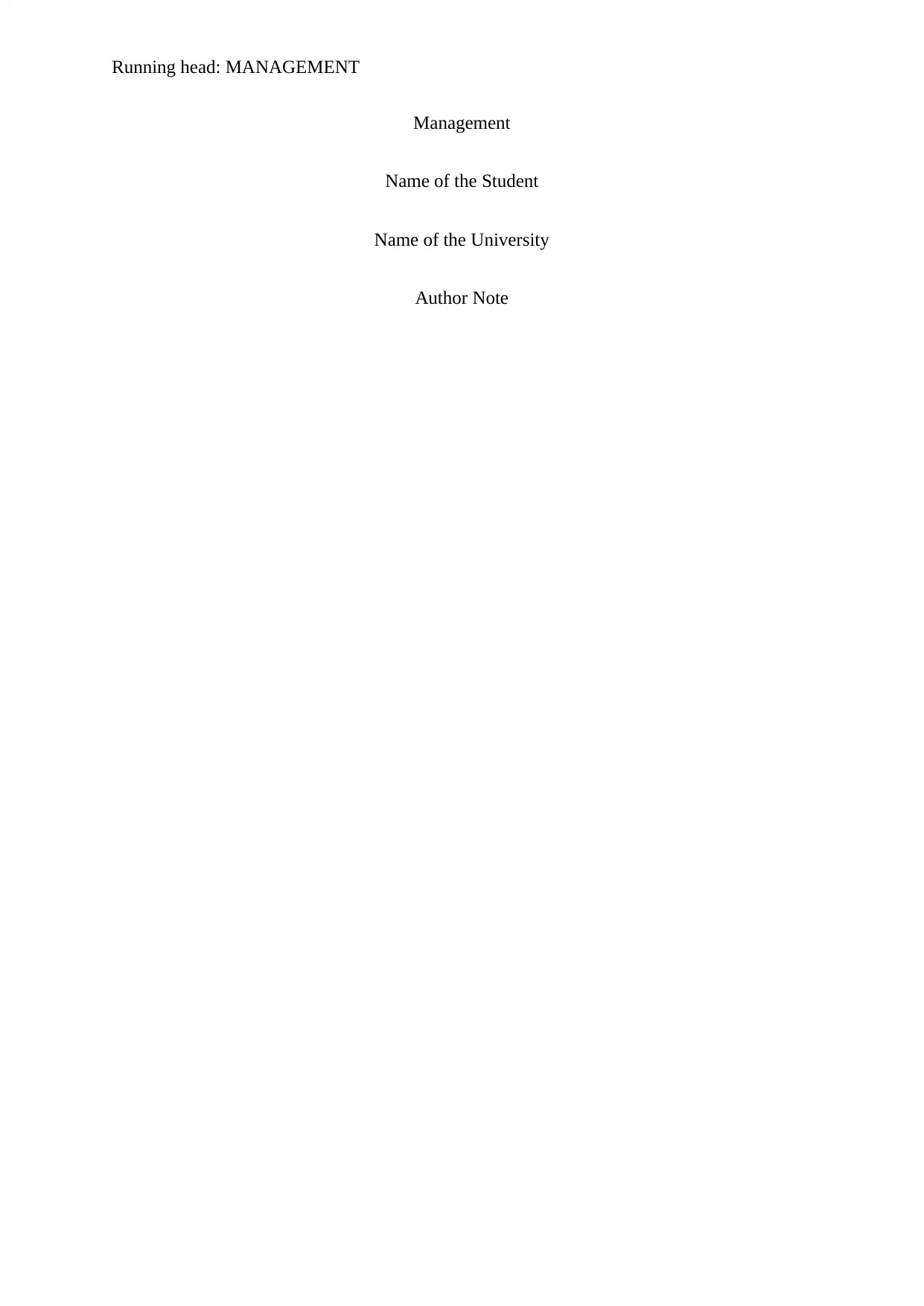
Running head: MANAGEMENT
Management
Name of the Student
Name of the University
Author Note
Management
Name of the Student
Name of the University
Author Note
Paraphrase This Document
Need a fresh take? Get an instant paraphrase of this document with our AI Paraphraser
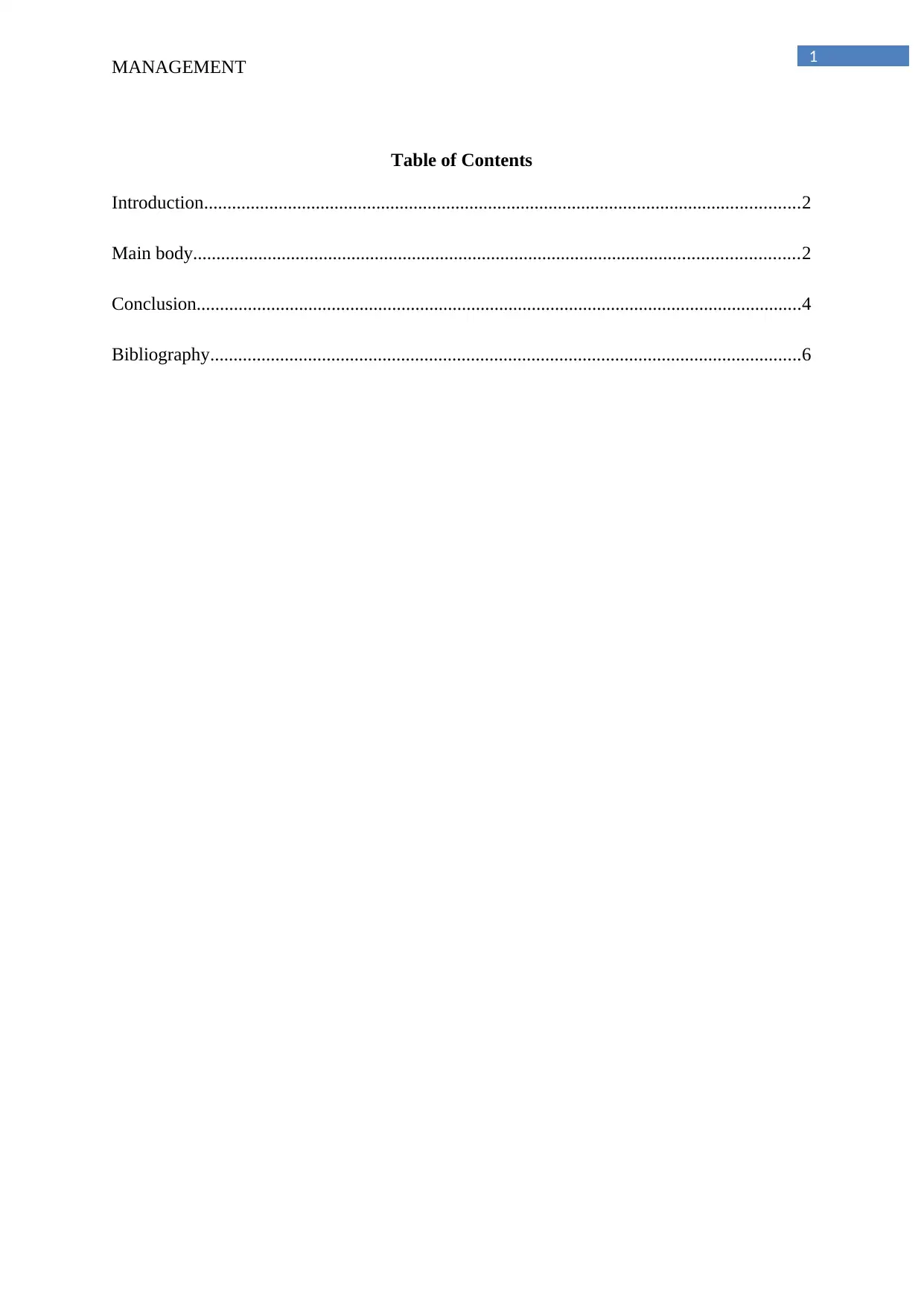
1
MANAGEMENT
Table of Contents
Introduction................................................................................................................................2
Main body..................................................................................................................................2
Conclusion..................................................................................................................................4
Bibliography...............................................................................................................................6
MANAGEMENT
Table of Contents
Introduction................................................................................................................................2
Main body..................................................................................................................................2
Conclusion..................................................................................................................................4
Bibliography...............................................................................................................................6
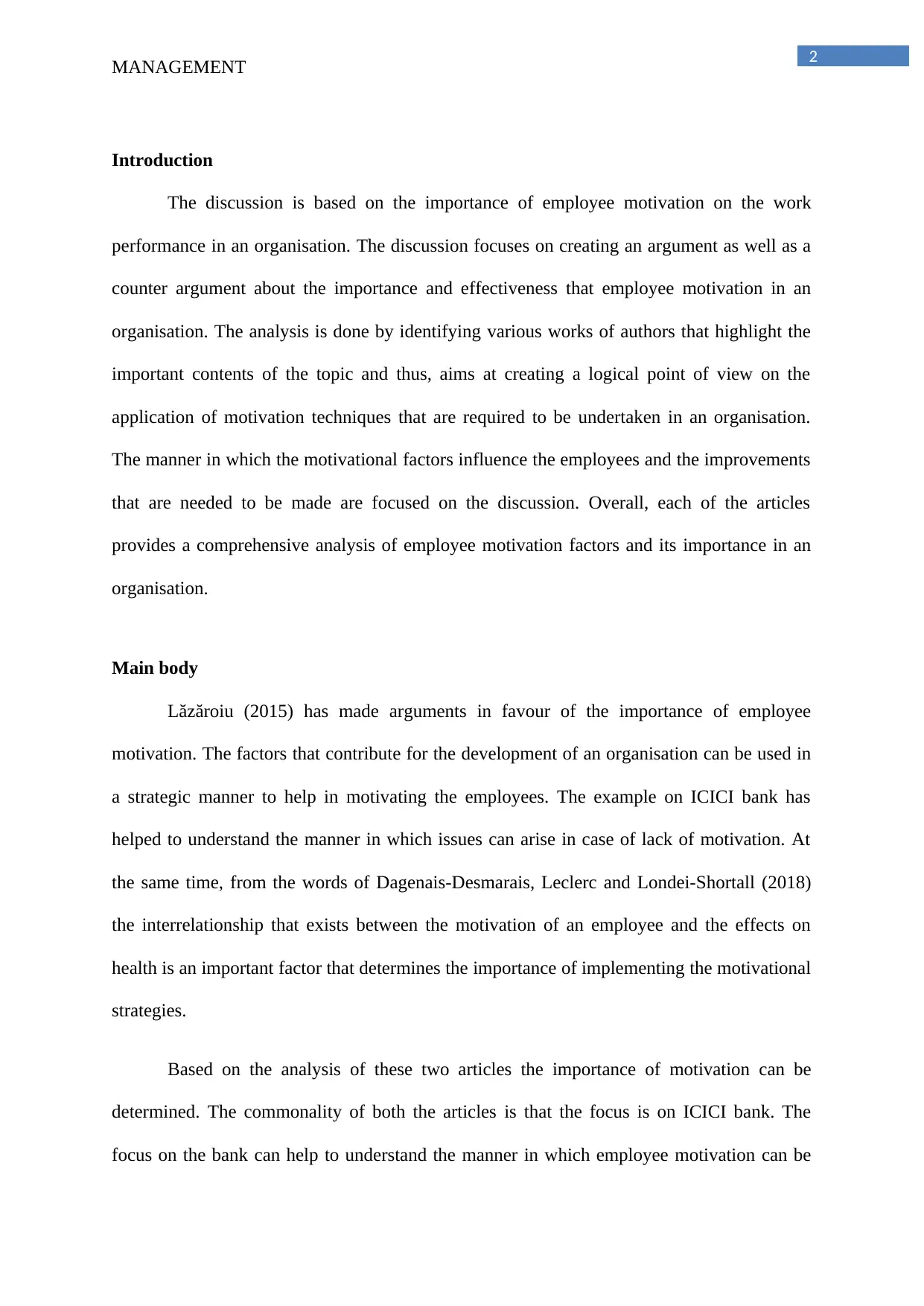
2
MANAGEMENT
Introduction
The discussion is based on the importance of employee motivation on the work
performance in an organisation. The discussion focuses on creating an argument as well as a
counter argument about the importance and effectiveness that employee motivation in an
organisation. The analysis is done by identifying various works of authors that highlight the
important contents of the topic and thus, aims at creating a logical point of view on the
application of motivation techniques that are required to be undertaken in an organisation.
The manner in which the motivational factors influence the employees and the improvements
that are needed to be made are focused on the discussion. Overall, each of the articles
provides a comprehensive analysis of employee motivation factors and its importance in an
organisation.
Main body
Lăzăroiu (2015) has made arguments in favour of the importance of employee
motivation. The factors that contribute for the development of an organisation can be used in
a strategic manner to help in motivating the employees. The example on ICICI bank has
helped to understand the manner in which issues can arise in case of lack of motivation. At
the same time, from the words of Dagenais-Desmarais, Leclerc and Londei-Shortall (2018)
the interrelationship that exists between the motivation of an employee and the effects on
health is an important factor that determines the importance of implementing the motivational
strategies.
Based on the analysis of these two articles the importance of motivation can be
determined. The commonality of both the articles is that the focus is on ICICI bank. The
focus on the bank can help to understand the manner in which employee motivation can be
MANAGEMENT
Introduction
The discussion is based on the importance of employee motivation on the work
performance in an organisation. The discussion focuses on creating an argument as well as a
counter argument about the importance and effectiveness that employee motivation in an
organisation. The analysis is done by identifying various works of authors that highlight the
important contents of the topic and thus, aims at creating a logical point of view on the
application of motivation techniques that are required to be undertaken in an organisation.
The manner in which the motivational factors influence the employees and the improvements
that are needed to be made are focused on the discussion. Overall, each of the articles
provides a comprehensive analysis of employee motivation factors and its importance in an
organisation.
Main body
Lăzăroiu (2015) has made arguments in favour of the importance of employee
motivation. The factors that contribute for the development of an organisation can be used in
a strategic manner to help in motivating the employees. The example on ICICI bank has
helped to understand the manner in which issues can arise in case of lack of motivation. At
the same time, from the words of Dagenais-Desmarais, Leclerc and Londei-Shortall (2018)
the interrelationship that exists between the motivation of an employee and the effects on
health is an important factor that determines the importance of implementing the motivational
strategies.
Based on the analysis of these two articles the importance of motivation can be
determined. The commonality of both the articles is that the focus is on ICICI bank. The
focus on the bank can help to understand the manner in which employee motivation can be
⊘ This is a preview!⊘
Do you want full access?
Subscribe today to unlock all pages.

Trusted by 1+ million students worldwide
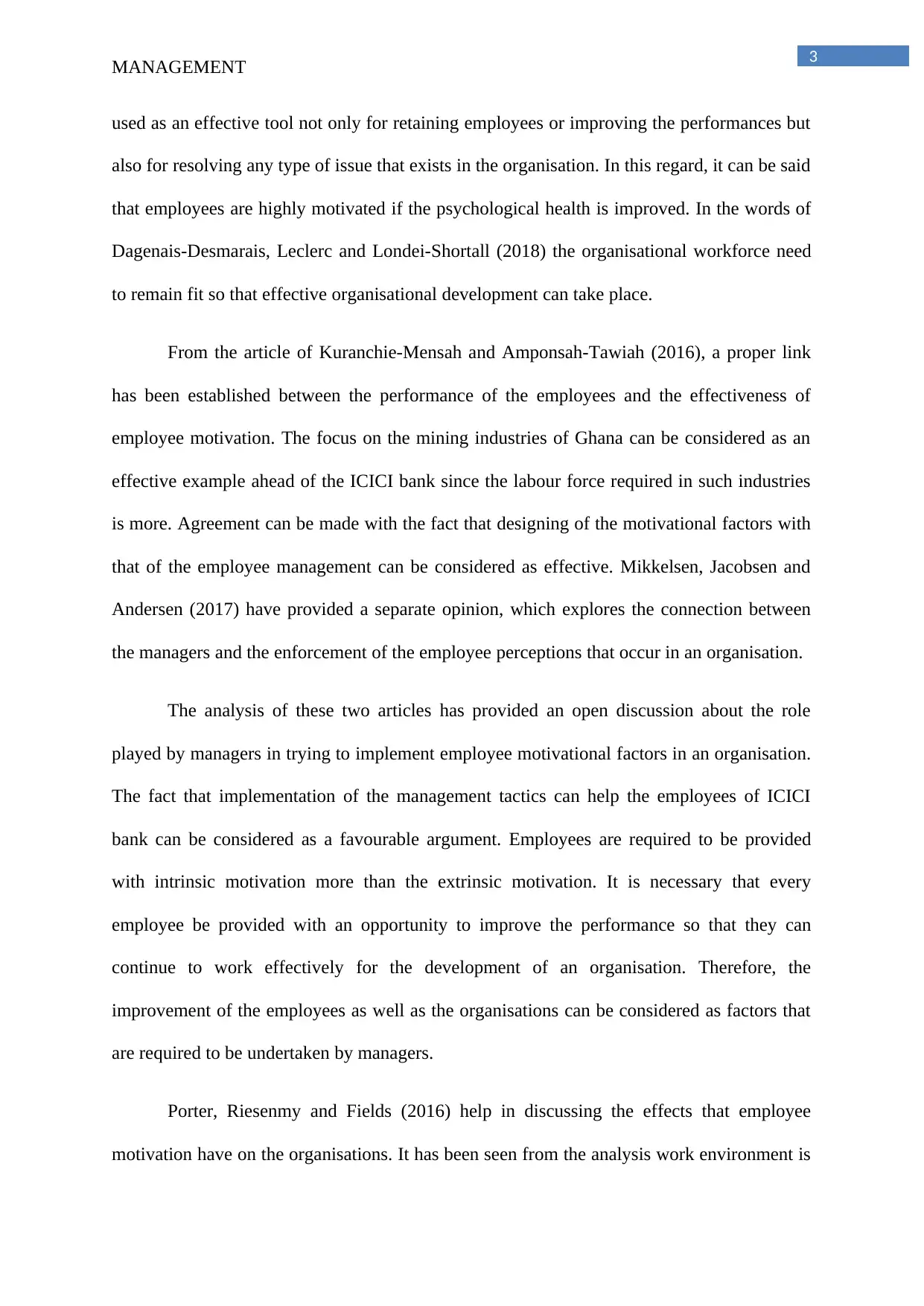
3
MANAGEMENT
used as an effective tool not only for retaining employees or improving the performances but
also for resolving any type of issue that exists in the organisation. In this regard, it can be said
that employees are highly motivated if the psychological health is improved. In the words of
Dagenais-Desmarais, Leclerc and Londei-Shortall (2018) the organisational workforce need
to remain fit so that effective organisational development can take place.
From the article of Kuranchie-Mensah and Amponsah-Tawiah (2016), a proper link
has been established between the performance of the employees and the effectiveness of
employee motivation. The focus on the mining industries of Ghana can be considered as an
effective example ahead of the ICICI bank since the labour force required in such industries
is more. Agreement can be made with the fact that designing of the motivational factors with
that of the employee management can be considered as effective. Mikkelsen, Jacobsen and
Andersen (2017) have provided a separate opinion, which explores the connection between
the managers and the enforcement of the employee perceptions that occur in an organisation.
The analysis of these two articles has provided an open discussion about the role
played by managers in trying to implement employee motivational factors in an organisation.
The fact that implementation of the management tactics can help the employees of ICICI
bank can be considered as a favourable argument. Employees are required to be provided
with intrinsic motivation more than the extrinsic motivation. It is necessary that every
employee be provided with an opportunity to improve the performance so that they can
continue to work effectively for the development of an organisation. Therefore, the
improvement of the employees as well as the organisations can be considered as factors that
are required to be undertaken by managers.
Porter, Riesenmy and Fields (2016) help in discussing the effects that employee
motivation have on the organisations. It has been seen from the analysis work environment is
MANAGEMENT
used as an effective tool not only for retaining employees or improving the performances but
also for resolving any type of issue that exists in the organisation. In this regard, it can be said
that employees are highly motivated if the psychological health is improved. In the words of
Dagenais-Desmarais, Leclerc and Londei-Shortall (2018) the organisational workforce need
to remain fit so that effective organisational development can take place.
From the article of Kuranchie-Mensah and Amponsah-Tawiah (2016), a proper link
has been established between the performance of the employees and the effectiveness of
employee motivation. The focus on the mining industries of Ghana can be considered as an
effective example ahead of the ICICI bank since the labour force required in such industries
is more. Agreement can be made with the fact that designing of the motivational factors with
that of the employee management can be considered as effective. Mikkelsen, Jacobsen and
Andersen (2017) have provided a separate opinion, which explores the connection between
the managers and the enforcement of the employee perceptions that occur in an organisation.
The analysis of these two articles has provided an open discussion about the role
played by managers in trying to implement employee motivational factors in an organisation.
The fact that implementation of the management tactics can help the employees of ICICI
bank can be considered as a favourable argument. Employees are required to be provided
with intrinsic motivation more than the extrinsic motivation. It is necessary that every
employee be provided with an opportunity to improve the performance so that they can
continue to work effectively for the development of an organisation. Therefore, the
improvement of the employees as well as the organisations can be considered as factors that
are required to be undertaken by managers.
Porter, Riesenmy and Fields (2016) help in discussing the effects that employee
motivation have on the organisations. It has been seen from the analysis work environment is
Paraphrase This Document
Need a fresh take? Get an instant paraphrase of this document with our AI Paraphraser
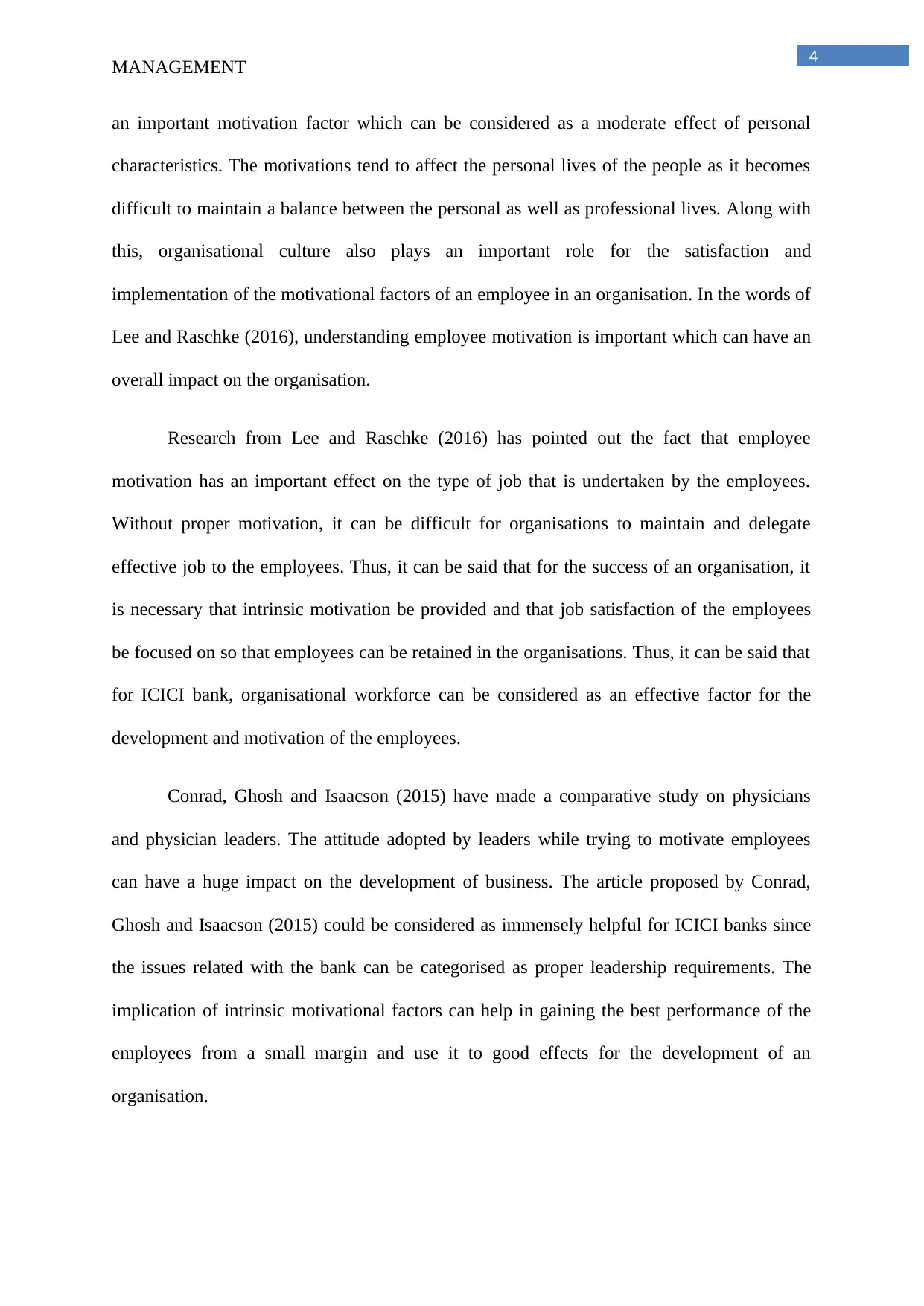
4
MANAGEMENT
an important motivation factor which can be considered as a moderate effect of personal
characteristics. The motivations tend to affect the personal lives of the people as it becomes
difficult to maintain a balance between the personal as well as professional lives. Along with
this, organisational culture also plays an important role for the satisfaction and
implementation of the motivational factors of an employee in an organisation. In the words of
Lee and Raschke (2016), understanding employee motivation is important which can have an
overall impact on the organisation.
Research from Lee and Raschke (2016) has pointed out the fact that employee
motivation has an important effect on the type of job that is undertaken by the employees.
Without proper motivation, it can be difficult for organisations to maintain and delegate
effective job to the employees. Thus, it can be said that for the success of an organisation, it
is necessary that intrinsic motivation be provided and that job satisfaction of the employees
be focused on so that employees can be retained in the organisations. Thus, it can be said that
for ICICI bank, organisational workforce can be considered as an effective factor for the
development and motivation of the employees.
Conrad, Ghosh and Isaacson (2015) have made a comparative study on physicians
and physician leaders. The attitude adopted by leaders while trying to motivate employees
can have a huge impact on the development of business. The article proposed by Conrad,
Ghosh and Isaacson (2015) could be considered as immensely helpful for ICICI banks since
the issues related with the bank can be categorised as proper leadership requirements. The
implication of intrinsic motivational factors can help in gaining the best performance of the
employees from a small margin and use it to good effects for the development of an
organisation.
MANAGEMENT
an important motivation factor which can be considered as a moderate effect of personal
characteristics. The motivations tend to affect the personal lives of the people as it becomes
difficult to maintain a balance between the personal as well as professional lives. Along with
this, organisational culture also plays an important role for the satisfaction and
implementation of the motivational factors of an employee in an organisation. In the words of
Lee and Raschke (2016), understanding employee motivation is important which can have an
overall impact on the organisation.
Research from Lee and Raschke (2016) has pointed out the fact that employee
motivation has an important effect on the type of job that is undertaken by the employees.
Without proper motivation, it can be difficult for organisations to maintain and delegate
effective job to the employees. Thus, it can be said that for the success of an organisation, it
is necessary that intrinsic motivation be provided and that job satisfaction of the employees
be focused on so that employees can be retained in the organisations. Thus, it can be said that
for ICICI bank, organisational workforce can be considered as an effective factor for the
development and motivation of the employees.
Conrad, Ghosh and Isaacson (2015) have made a comparative study on physicians
and physician leaders. The attitude adopted by leaders while trying to motivate employees
can have a huge impact on the development of business. The article proposed by Conrad,
Ghosh and Isaacson (2015) could be considered as immensely helpful for ICICI banks since
the issues related with the bank can be categorised as proper leadership requirements. The
implication of intrinsic motivational factors can help in gaining the best performance of the
employees from a small margin and use it to good effects for the development of an
organisation.
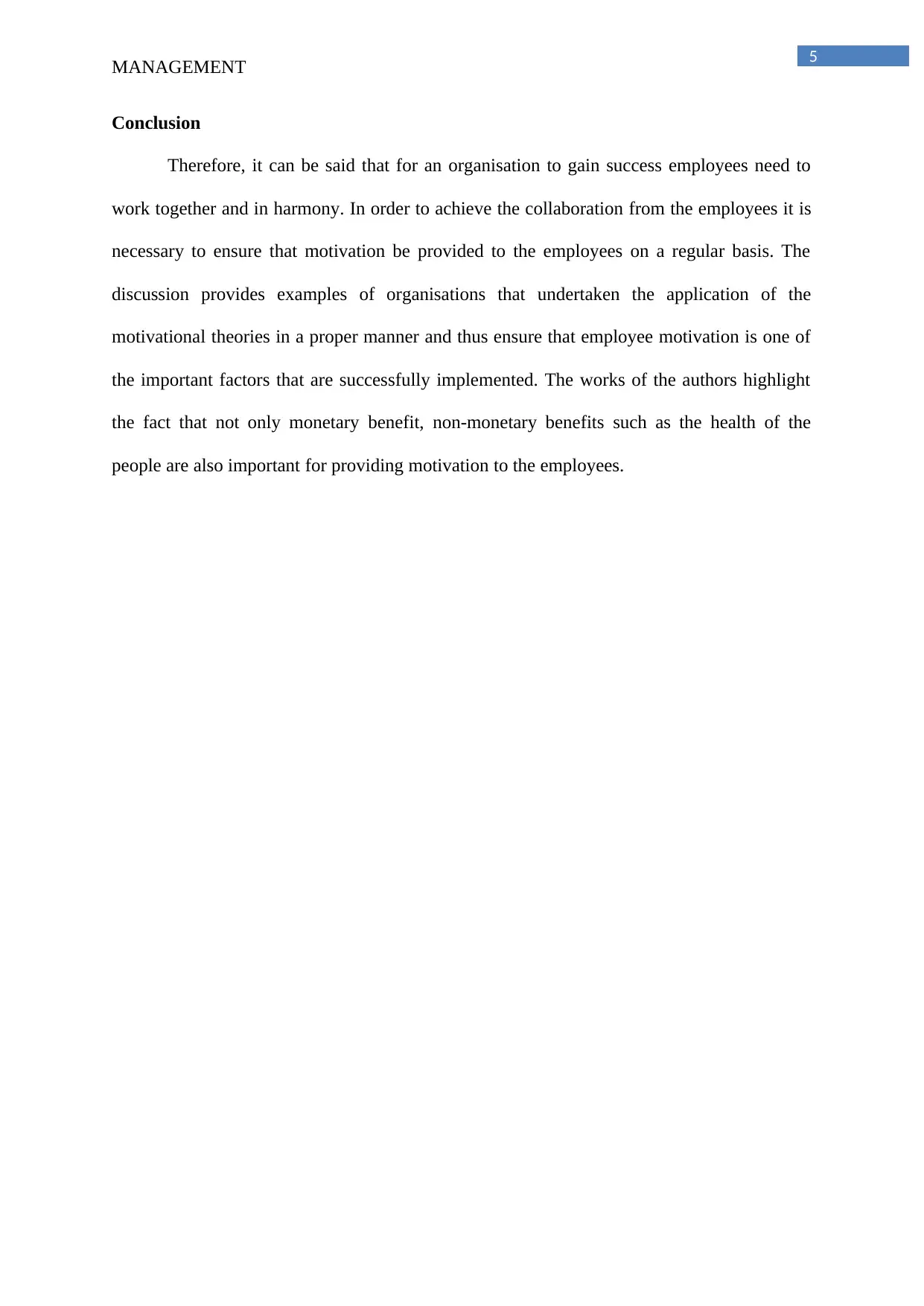
5
MANAGEMENT
Conclusion
Therefore, it can be said that for an organisation to gain success employees need to
work together and in harmony. In order to achieve the collaboration from the employees it is
necessary to ensure that motivation be provided to the employees on a regular basis. The
discussion provides examples of organisations that undertaken the application of the
motivational theories in a proper manner and thus ensure that employee motivation is one of
the important factors that are successfully implemented. The works of the authors highlight
the fact that not only monetary benefit, non-monetary benefits such as the health of the
people are also important for providing motivation to the employees.
MANAGEMENT
Conclusion
Therefore, it can be said that for an organisation to gain success employees need to
work together and in harmony. In order to achieve the collaboration from the employees it is
necessary to ensure that motivation be provided to the employees on a regular basis. The
discussion provides examples of organisations that undertaken the application of the
motivational theories in a proper manner and thus ensure that employee motivation is one of
the important factors that are successfully implemented. The works of the authors highlight
the fact that not only monetary benefit, non-monetary benefits such as the health of the
people are also important for providing motivation to the employees.
⊘ This is a preview!⊘
Do you want full access?
Subscribe today to unlock all pages.

Trusted by 1+ million students worldwide
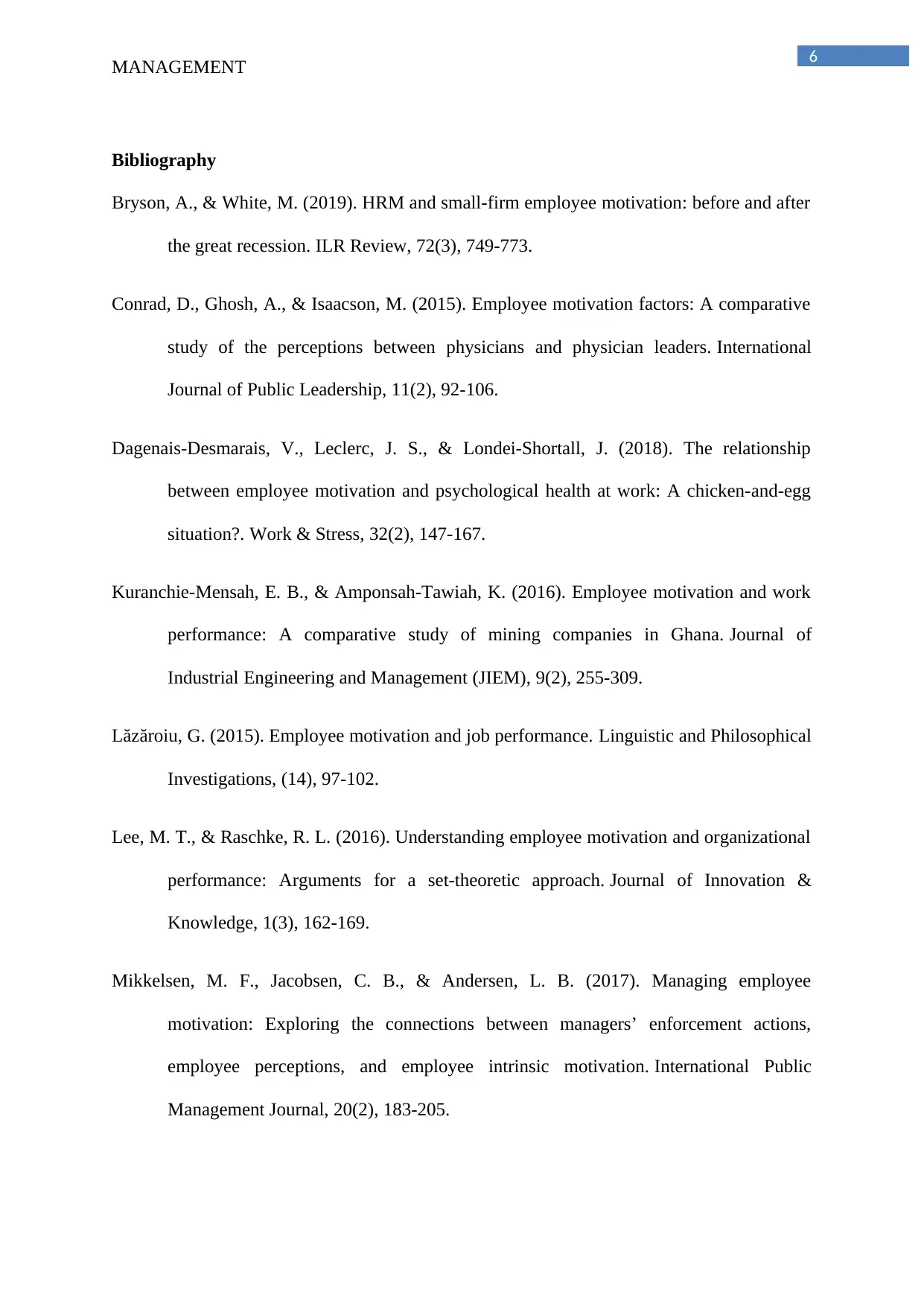
6
MANAGEMENT
Bibliography
Bryson, A., & White, M. (2019). HRM and small-firm employee motivation: before and after
the great recession. ILR Review, 72(3), 749-773.
Conrad, D., Ghosh, A., & Isaacson, M. (2015). Employee motivation factors: A comparative
study of the perceptions between physicians and physician leaders. International
Journal of Public Leadership, 11(2), 92-106.
Dagenais-Desmarais, V., Leclerc, J. S., & Londei-Shortall, J. (2018). The relationship
between employee motivation and psychological health at work: A chicken-and-egg
situation?. Work & Stress, 32(2), 147-167.
Kuranchie-Mensah, E. B., & Amponsah-Tawiah, K. (2016). Employee motivation and work
performance: A comparative study of mining companies in Ghana. Journal of
Industrial Engineering and Management (JIEM), 9(2), 255-309.
Lăzăroiu, G. (2015). Employee motivation and job performance. Linguistic and Philosophical
Investigations, (14), 97-102.
Lee, M. T., & Raschke, R. L. (2016). Understanding employee motivation and organizational
performance: Arguments for a set-theoretic approach. Journal of Innovation &
Knowledge, 1(3), 162-169.
Mikkelsen, M. F., Jacobsen, C. B., & Andersen, L. B. (2017). Managing employee
motivation: Exploring the connections between managers’ enforcement actions,
employee perceptions, and employee intrinsic motivation. International Public
Management Journal, 20(2), 183-205.
MANAGEMENT
Bibliography
Bryson, A., & White, M. (2019). HRM and small-firm employee motivation: before and after
the great recession. ILR Review, 72(3), 749-773.
Conrad, D., Ghosh, A., & Isaacson, M. (2015). Employee motivation factors: A comparative
study of the perceptions between physicians and physician leaders. International
Journal of Public Leadership, 11(2), 92-106.
Dagenais-Desmarais, V., Leclerc, J. S., & Londei-Shortall, J. (2018). The relationship
between employee motivation and psychological health at work: A chicken-and-egg
situation?. Work & Stress, 32(2), 147-167.
Kuranchie-Mensah, E. B., & Amponsah-Tawiah, K. (2016). Employee motivation and work
performance: A comparative study of mining companies in Ghana. Journal of
Industrial Engineering and Management (JIEM), 9(2), 255-309.
Lăzăroiu, G. (2015). Employee motivation and job performance. Linguistic and Philosophical
Investigations, (14), 97-102.
Lee, M. T., & Raschke, R. L. (2016). Understanding employee motivation and organizational
performance: Arguments for a set-theoretic approach. Journal of Innovation &
Knowledge, 1(3), 162-169.
Mikkelsen, M. F., Jacobsen, C. B., & Andersen, L. B. (2017). Managing employee
motivation: Exploring the connections between managers’ enforcement actions,
employee perceptions, and employee intrinsic motivation. International Public
Management Journal, 20(2), 183-205.
Paraphrase This Document
Need a fresh take? Get an instant paraphrase of this document with our AI Paraphraser
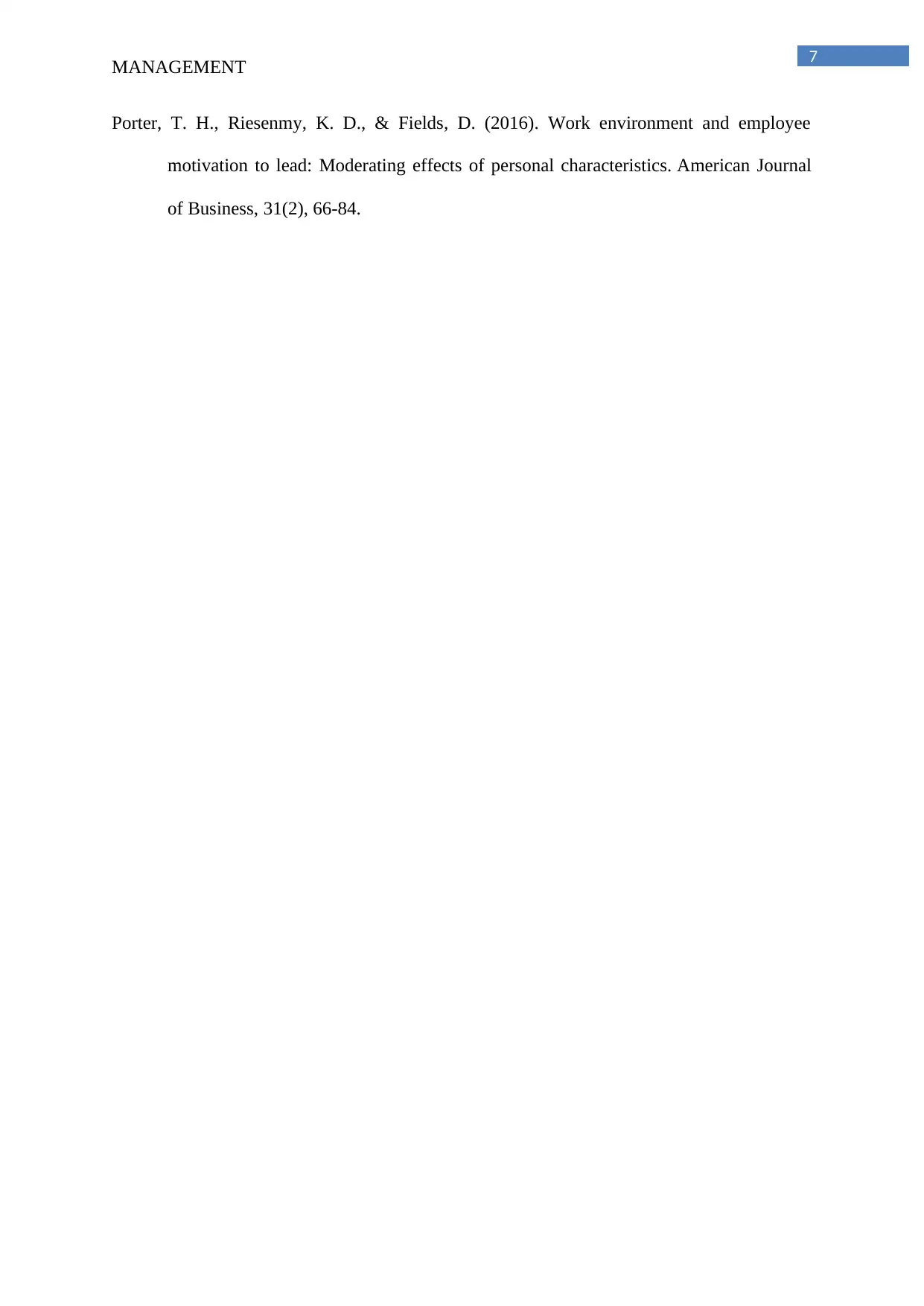
7
MANAGEMENT
Porter, T. H., Riesenmy, K. D., & Fields, D. (2016). Work environment and employee
motivation to lead: Moderating effects of personal characteristics. American Journal
of Business, 31(2), 66-84.
MANAGEMENT
Porter, T. H., Riesenmy, K. D., & Fields, D. (2016). Work environment and employee
motivation to lead: Moderating effects of personal characteristics. American Journal
of Business, 31(2), 66-84.
1 out of 8
Related Documents
Your All-in-One AI-Powered Toolkit for Academic Success.
+13062052269
info@desklib.com
Available 24*7 on WhatsApp / Email
![[object Object]](/_next/static/media/star-bottom.7253800d.svg)
Unlock your academic potential
Copyright © 2020–2026 A2Z Services. All Rights Reserved. Developed and managed by ZUCOL.





